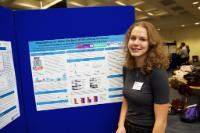2016 Participants
 Charlotte Sanders
Charlotte Sanders
- BSc (Hons) Pharmacology
- New Genes and Molecular Mechanisms of Complex III Deficiency in Mitochondrial Disease: Functional Effects of a Candidate UQCRH Variant in Patient Fibroblasts
Mitochondria are often called the ‘powerhouses of the cell’, producing the energy source ATP (adenosine triphosphate). Mitochondrial DNA (mtDNA) and nuclear DNA (nDNA) encode the machinery of ATP production and contain genetic defects in mitochondrial disease. Mitochondrial diseases are so debilitating that research has looked to controversial techniques such as the 3 parent baby to replace faulty mtDNA. Despite this, a spectrum of causative mutations remain undefined in terms of molecular genetics and their effects on assembly and function of mitochondrial ATP-producing protein complexes, known as respiratory chain or oxidative phosphorylation (OXPHOS) complexes. This project studies a candidate patient of first-cousin parentage who has inherited such a mutation and presents with mitochondrial disease. Next generation sequencing determined that the defect occurs in DNA encoding a subunit of complex III, an OXPHOS protein. The aim of the ongoing project is to establish the molecular aetiology of the patient’s complex III deficiency.
Funding source: British Inherited Metabolic Group
Supervisor: Prof Robert Taylor
